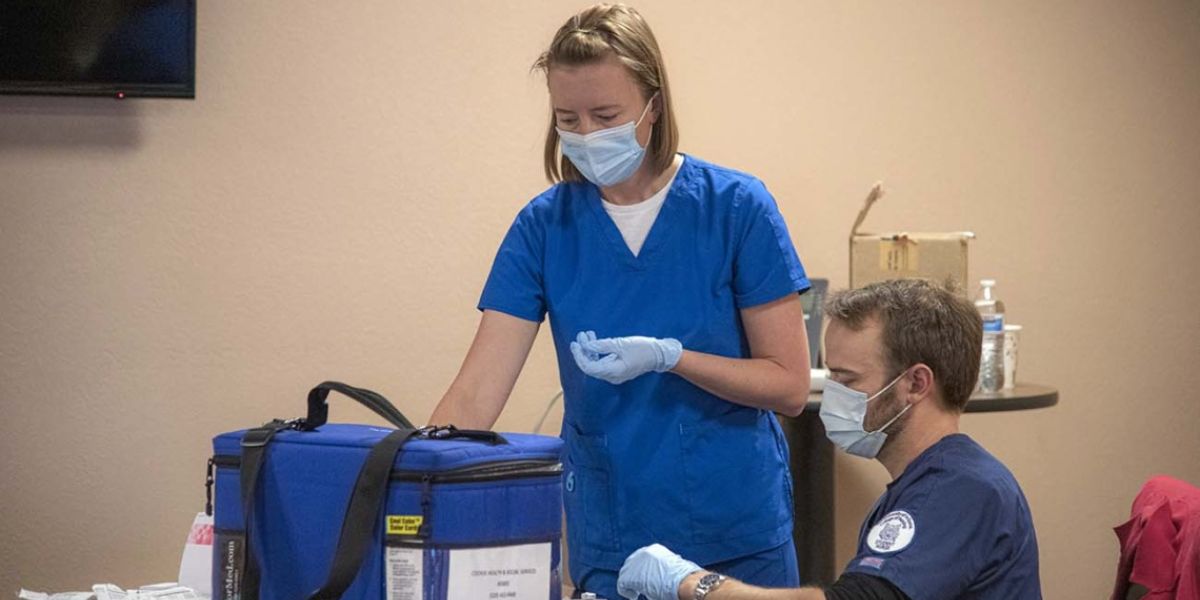From Cavities to Covid: Arizona Clinic’s Dental-Driven Vaccination Triumph
Faced with historically low immunization rates and extraordinary increases in vaccine reluctance during the COVID-19 epidemic, one rural Arizona medical institution attempted a novel approach: providing immunizations during dental visits.
“We have the opportunity to get them the vaccines at this dental appointment, rather than not getting them the vaccines at all, which would be the case if they’re just coming to dental appointments,” said Kelsey Vincent, program manager of Chiricahua Community Health Centers’ vaccine program.
Chiricahua began the pilot phase of the adult program in August 2022, and since then, more than 1,800 immunizations have been distributed to children and adults who would not have received them otherwise.
The program’s success led to Chiricahua being named one of the recipients of this year’s Arizona Big Shots Awards by The Arizona Partnership for Immunization for promoting the health and wellness of Arizona’s communities through increased immunization rates.
It is an example of “Chiricahua going the extra mile, having an evidence base in our practice,” according to Dennis Walto, Chiricahua’s chief of external affairs and foundation executive director. “This is health equity in action.”
Chiricahua reported a decline in immunization coverage in pediatric patients from 48% to 35% by 2022.
Before the program’s implementation, less than 41% of the medical center’s patients had received the flu vaccination, and only 33% had completed the COVID-19 vaccine series.
When the medical center noticed a decline in immunization rates during the pandemic, Chiricahua clinics increased outreach and deployed their mobile clinic to raise vaccination rates. However, following the initial increase, immunization rates in Cochise County began to reflect the national drop.
This drop was caused in part by the epidemic. COVID-19 has an impact on healthcare delivery, particularly immunization programs, around the world, according to a global 2021 study.
Nationally, the Centers for Disease Control and Prevention discovered a drop in vaccine coverage among children and adolescents, placing them at risk for avoidable illnesses.
Between 2018 and 2021, the Arizona Center for Investigative Reporting discovered that around 60% of roughly 1,000 Arizona kindergarten schools had a reduction in pupils considered immune to measles, mumps, and rubella. According to the data, the fall reflected a years-long decline in immunization rates among Arizona students in general.
Chiricahua also Had an Increase in HPV Vaccines
During Chiricahua’s dental integration program, clinicians reported an increase in human papillomavirus vaccinations, which are a crucial strategy for preventing cervical cancer and other types of cancer. Chiricahua gave 2,330 HPV vaccines in 2023, up from 1,933 the previous year, representing a more than 20% increase.
In a video interview, Emily Harris, Chiricahua’s director of community health, stated that discussing the vaccine’s capacity to prevent oropharyngeal cancer flips the narrative and provides a unique opportunity to highlight its life-saving benefits.
Harris mentioned the global effort to give HPV vaccines, in part because it entails a discussion about sexual health. She cited a prevalent notion among parents that discussing sexual health will encourage specific types of behavior.
“It makes it tricky and taboo to bring up a vaccine that is, really, really vital to cancer prevention,” Harris told the audience.
A 2021 study analyzed the movement in parental attitudes toward the HPV vaccine and discovered that it rose in certain ethnic and age groups. The survey discovered that slightly more than half of teenagers in the United States had gotten two or more doses of the vaccination.
Chiricahua Helps Individuals in Distant Areas Get Healthcare
One barrier to receiving medical care in rural Arizona is the great distances people must drive for medical visits. Offering immunizations at dental checkups allows Chiricahua to make the most of each health visit.
“We have to take advantage of every encounter and reduce the missed opportunity when you may have someone in your office who’s had to take the day off from work or has driven 45 miles to get to you,” Walto went on to say.
To eliminate barriers to healthcare access, Chiricahua has opened clinics around the county and is expanding its mobile clinic program to serve the majority of rural patients.
While Chiricahua is aiming to reduce barriers to healthcare access, the group is also expanding the dental integration program and training other health facilities to undertake similar programs.
“We created this to be scalable and replicable in other Federally Qualified Health Centers or other clinic settings, anywhere throughout the country or even further,” Harris went on to say.











